This story of mine, Lost in Time, appeared late last year on Love in the Time of COVID, an international online journal edited by Michelle Elvy and Witi Ihimaera.
Love in the Time of COVID
A Chronicle of a Pandemic
Lost in Time – by Caroline Barron
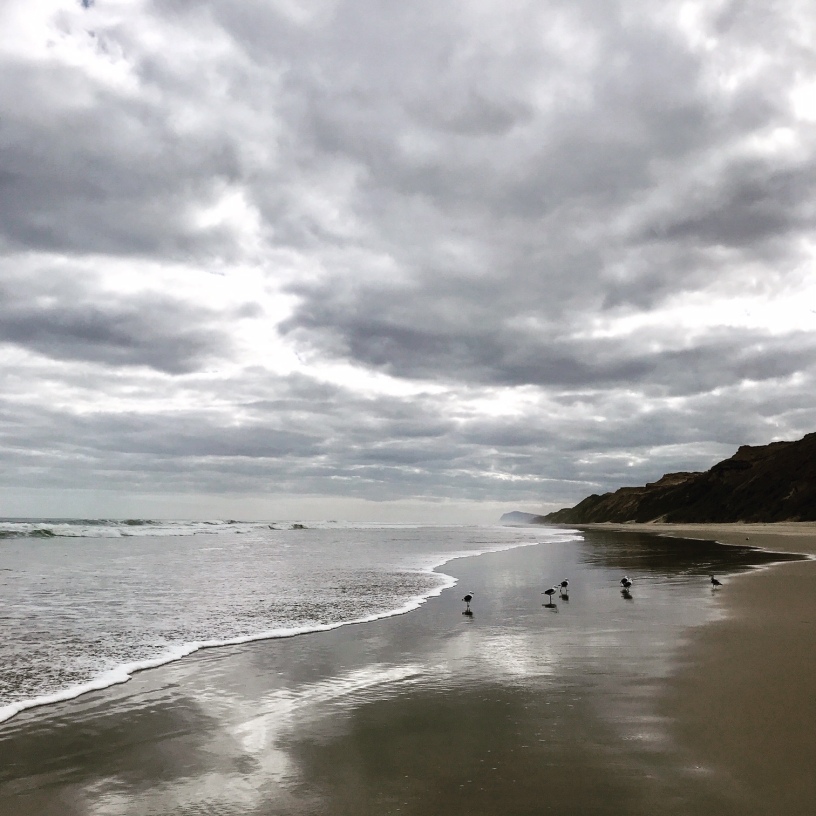
Point Chevalier, Auckland, New Zealand
August 2020: Lockdown 2.0
Time has become a fragmented line, sabotaged and stolen by occurrences both extraordinary and banal. It’s the innocuous time-stealers that are the most stealthy: a love heart on an Instagram post that sends you hurtling away, embezzling dozens of minutes never recompensed; a laptop that randomly untethers from wifi when the children’s school Zoom begins in two minutes. An hour gone. Or the conglomeration of minutes whiled away in the kitchen—chopping, stirring, unstacking, washing. Who knew how time-consuming it could be having four human- and two pet-mouths and hearts to feed, all home at once, for weeks.
These small things add up, chip away at a day.
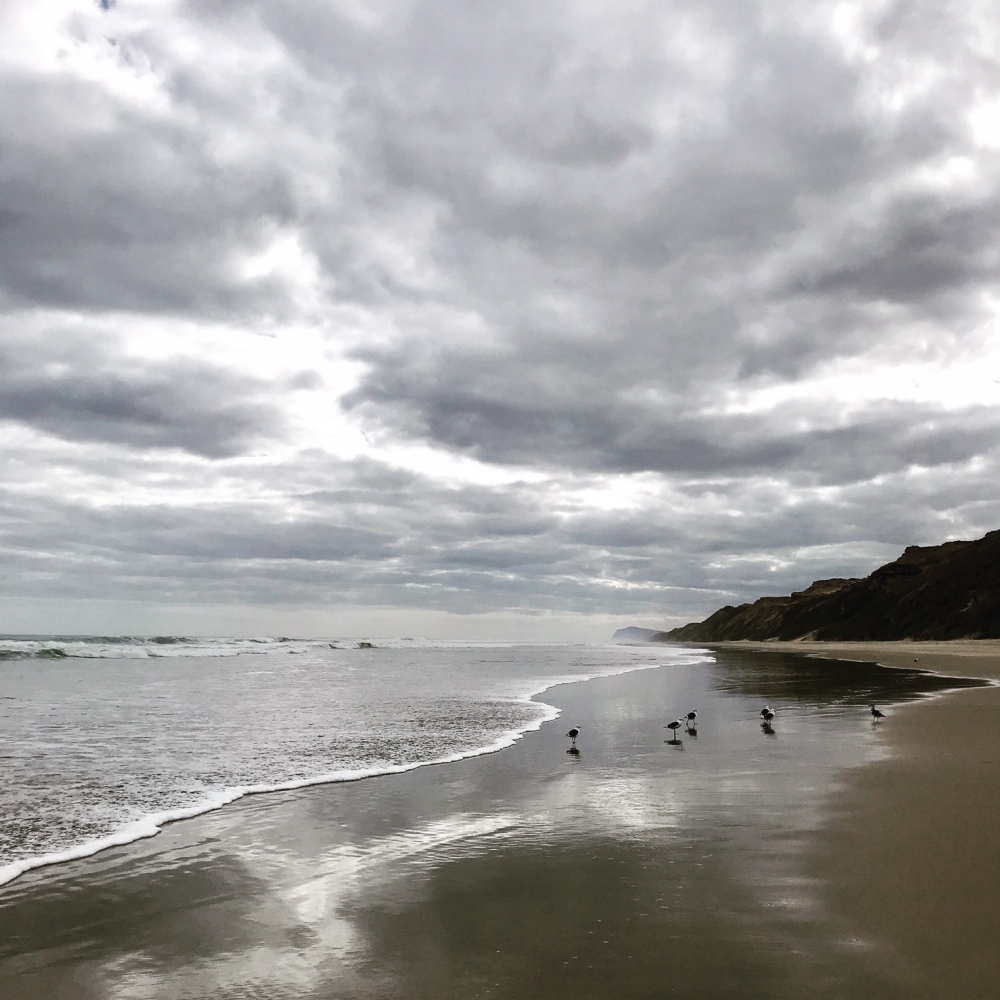
When the biggest time disrupter airdropped into our lives in March—seven weeks of Lockdown 1.0—we headed North before the rules preventing us from leaving Auckland were absolute. Seven weeks at Ripiro—107 kilometres of deserted west coast beach.
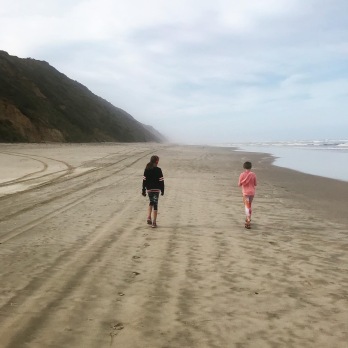 There, we spent more time together as a family than we ever will again in our lives. We avoided the supermarket, catching grey mullet in our 30-metre net, wriggling our fingers into the sand for tuatua—higher up the beach than usual, at the gully by the islands—all beneath a ridiculously blue sky. Each day after school lessons were done, Norah—our Labrador—and I would walk for miles up to the second waterfall and back. No masks required, few people.
There, we spent more time together as a family than we ever will again in our lives. We avoided the supermarket, catching grey mullet in our 30-metre net, wriggling our fingers into the sand for tuatua—higher up the beach than usual, at the gully by the islands—all beneath a ridiculously blue sky. Each day after school lessons were done, Norah—our Labrador—and I would walk for miles up to the second waterfall and back. No masks required, few people.
There, time stood still.
This time, in Lockdown 2.0 in the city, I am reminded of my body’s reliance on its inbuilt calendar to uphold the bones of time’s skeleton. Not only its circadian days and nights, but the reassuring rhythm of seasons rolling over, of birthdays and rituals, school terms. Beginnings and ends. I cannot shake the feeling that time has been stolen from me. I keep opening my diary to April, yet it is August.
This makes me laugh because this ‘knowing where you stand in time’ is a drum my manuscript assessment clients get used to me banging on. Be sure to orient your reader in place and time, I write in almost every report. Be sure to know from what point on your timeline you are standing, to tell your story. Who am I to talk? I’m lost in time. Bewildered.
Perhaps this lockdown feels harder than the last because of Ripiro’s shadow. Because I’m yearning for its wide-open spaces. Here, in the city, masks are required. There are so many people.
Here, time speeds up.
The pressing closeness of humanity—both within our whare and out—has me feeling claustrophobic. Panicky. There is a static hum inside my head that, some days, is so deafening I cannot think. I cannot fight. I cannot flee. I simply freeze.
Yet more time is ransacked by trying not to ask the big questions, knowing I do not have the capacity to face the answers. How will it ever end? Do we need to reframe this as our new normal? If there’s no vaccine, what happens? And for how long? Two hours drain away trawling sites about the 1918 Spanish flu, the disease that struck down my great-grandfather, Montrose Stanaway, at just 26 – its calamitous impact still with us three generations on. There was no vaccine then. Just a fire burning through the world, until it didn’t.
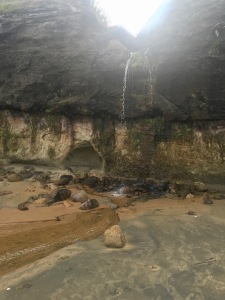 Lockdown 2.0 is almost at an end. Despite everything, I’ve already started looking back at these weeks with a sense of wonder. The surreal, golden mist I had sketched around our Ripiro lockdown is seeping into these weeks, too. In three days the children will leave their kitchen-bench learning for real school; my husband will leave his lounge-desk for his office in the city. I will continue to work here at home, but reclaim quiet and solitude.
Lockdown 2.0 is almost at an end. Despite everything, I’ve already started looking back at these weeks with a sense of wonder. The surreal, golden mist I had sketched around our Ripiro lockdown is seeping into these weeks, too. In three days the children will leave their kitchen-bench learning for real school; my husband will leave his lounge-desk for his office in the city. I will continue to work here at home, but reclaim quiet and solitude.
Time will rebuild itself once more.
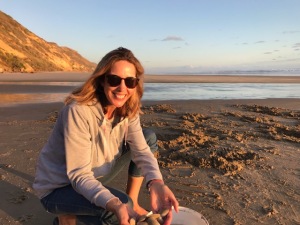 Caroline Barron is an award-winning writer, manuscript assessor, book reviewer, and trustee of the Michael King Writers Centre. Her debut book, Ripiro Beach: A Memoir of Life After Near Death (Bateman), is described by Dame Fiona Kidman as ‘one powerful read’. An RNZ reviewer calls it ‘honest and unsparing,’ ‘a really compelling read,’ and ‘such evocative writing’. Caroline’s awards include Auckland regional winner for the 2020 National Flash Fiction Day competition, the 2018 NZ Heritage Writing Award for short prose, 2018 NZ Society of Authors Manuscript Assessment Award and the hotly contested Lilian Ida Smith Award in 2015.
Caroline Barron is an award-winning writer, manuscript assessor, book reviewer, and trustee of the Michael King Writers Centre. Her debut book, Ripiro Beach: A Memoir of Life After Near Death (Bateman), is described by Dame Fiona Kidman as ‘one powerful read’. An RNZ reviewer calls it ‘honest and unsparing,’ ‘a really compelling read,’ and ‘such evocative writing’. Caroline’s awards include Auckland regional winner for the 2020 National Flash Fiction Day competition, the 2018 NZ Heritage Writing Award for short prose, 2018 NZ Society of Authors Manuscript Assessment Award and the hotly contested Lilian Ida Smith Award in 2015.
![]()